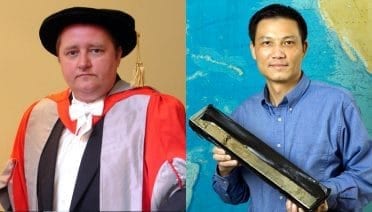Press Room
Searching for better ways to protect this endangered species, a team of researchers from Florida turned to the Woods Hole Oceanographic Institution for help in understanding how the animals behave underwater.
For the past few decades, scientists have offered several competing theories for what led to the extinction of the Neanderthals, with much of the debate focusing on the relative roles of climate change versus conflict with modern humans. Now one theory can be ruled out. New research by a multidisciplinary, international team?including paleoclimatologist Konrad Hughen of the Woods Hole Oceanographic Institution?shows that Neanderthals did not die out at a time of extreme and sudden climatic change, as some researchers have suggested.
Scientists at the Woods Hole Oceanographic Institution will host an international, interdisciplinary conference on the proposed use of ?iron fertilization? of the ocean as a means to combat rising concentrations of greenhouse gases in the atmosphere.
The release of sulfur and nitrogen into the atmosphere by power plants and agricultural activities plays a minor role in making the ocean slightly more acidic on a global scale, but the impact is greatly amplified in the shallower waters of the coastal ocean, according to new research by atmospheric and marine chemists.
The Joint Oceanographic Institutions (JOI) has awarded a $97.7 million contract to an academic partnership led by the WHOI to support the development, installation, and initial operation of the coastal and global components of the National Science Foundation?s Ocean Observatories Initiative (OOI). The WHOI partnership includes Scripps Institution of Oceanography at the University of California, San Diego, and Oregon State University?s College of Oceanic and Atmospheric Sciences.
Simon Thorrold, a fish ecologist from WHOI, has received a new research grant from the David and Lucile Packard Foundation to use harmless chemical tags to track the dispersal of the larvae of coral reef fishes in the western Pacific Ocean.
WHOI has awarded Lockheed Martin a $2.8 million contract for the initial design of the Replacement Human Occupied Vehicle (RHOV), a next generation three-person Deep Submergence Vehicle (DSV) that will be used by the U.S. scientific community. The contract has an option for subsequent construction of the RHOV once the initial design is completed and the project is approved to move forward.
Many earthquakes in the deep ocean are much lower in magnitude than expected. Geophysicists from the Woods Hole Oceanographic Institution (WHOI) have found new evidence that the fragmented structure of seafloor faults and previously unrecognized volcanism may be dampening the effects of these quakes.
A multidisciplinary team of scientists and engineers is conducting the first search for life and hot springs on the seafloor of the Arctic Ocean. Through the use of the World Wide Web and satellite communications, the Woods Hole Oceanographic Institution…
Researchers will probe the Gakkel Ridge during expedition that begins on July 1.
Newton P.S. Merrill, senior executive vice president (retired) of The Bank of New York, has been elected Chairman of the Board of Trustees of the Woods Hole Oceanographic Institution (WHOI). Merrill was elected at the Board’s spring meeting May 18…
The frequency of intense hurricanes in the Atlantic Ocean appears to be closely connected to long-term trends in the El Ni?o/Southern Oscillation and the African monsoon, according to new research from the Woods Hole Oceanographic Institution (WHOI). Geologists Jeff Donnelly and Jonathan Woodruff made that discovery while assembling the longest-ever record of hurricane strikes in the Atlantic basin.
B12an essential vitamin for land-dwelling animals, including humansalso turns out to be an essential ingredient for growing marine plants that are critical to the ocean food web and Earth’s climate, scientists have found. The presence or absence of B12 in…
A research team led by Dennis McGillicuddy of the Woods Hole Oceanographic Institution has shown that episodic, swirling current systems known as eddies act to pump nutrients up from the deep ocean to fuel such blooms.
Two senior scientists in the Department of Geology and Geophysics at the Woods Hole Oceanographic Institution (WHOI) have been honored for their outstanding contributions to understanding the makeup and dynamics of Earth’s ocean floor. On May 12, marine geochemist Chris…
This week, researchers will begin direct monitoring of the rumblings of a submarine volcano in the southeastern Caribbean Sea. On May 6, a team of scientists led by the Woods Hole Oceanographic Institution (WHOI) installed a new underwater earthquake monitoring…
Coral reef fish hatchlings dispersed by ocean currents are able to make their way back to their home reefs again to spawn, says a groundbreaking study published today in the journal Science. The study, whose findings are considered a major…
Geologists have recently devised a new method for reconstructing the history of severe storms along the coast: examine the steep slopes and cliffs left behind when severe wind and water erode the beach. After hurricanes and Nor’easters make landfall, they…
A lot of ocean science equipment goes into the water and never comes back. Some of it was intended to stay; other times, the sea claims it by force. Recently researchers used the WHOI-operated underwater vehicle Jason to take back…
When the levees broke in New Orleans after Hurricane Katrina, officials feared that Lake Pontchartrain might be infiltrated with disease-causing microbes from a “toxic gumbo” of water, polluted sediments, and sewage. In the weeks after the flood, scientists from several…

